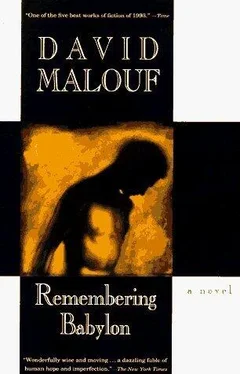Was he changed? He saw now that he must be, since they were as they had always been and he could not agree with them.
When had it begun?
When they agreed to take Gemmy in. That was the simple answer, since it was from that moment that some area of difference, of suspicion, had opened between them. But the more he thought of it, the clearer it seemed that the difference must always have existed, since he too was as he had always been; only he had been blind to it, or had put it out of his mind from an old wish to be accepted — and why not? — or a fear of standing alone.
He had never been a thinker, and he did not now become one, but he began to have strange thoughts.
Some of them were bitter. They had to do with what he saw, now that he looked, was in the hearts of men — quite ordinary fellows like himself; he wondered that he had not seen it before. What the other and stranger thoughts had to do with he did not know.
It was as if he had seen the world till now, not through his own eyes, out of some singular self, but through the eyes of a fellow who was always in company, even when he was alone; a sociable self, wrapped always in a communal warmth that protected it from dark matters and all the blinding light of things, but also from the knowledge that there was a place out there where the self might stand alone.
Wading through waist-high grass, he was surprised to see all the tips beaded with green, as if some new growth had come into the world that till now he had never seen or heard of.
When he looked closer it was hundreds of wee bright insects, each the size of his little fingernail, metallic, iridescent, and the discovery of them, the new light they brought to the scene, was a lightness in him — that was what surprised him — like a form of knowledge he had broken through to. It was unnameable, which disturbed him, but was also exhilarating; for a moment he was entirely happy.
But he wondered at himself. A grown man of forty with work to do, standing dreamily stilled, extending his hand, palm downwards, over the backs of insects, all suspended in their tiny lives in a jewel-like glittering.
Another time, by the creek, he looked up, casually he thought, and saw a bird. It was balanced on a rounded stone dipping its beak into the lightly running water, its grey squat body as undistinguished and dusty looking as a sparrow’s (but there were no sparrows here), its head grey, with a few untidy feathers.
He was sitting, himself, on a larger stone, also rounded, eating the last of a sandwich, his boots in mud.
But what his stilled blood saw was the bird’s beak drawing long silver threads out of the heart of the water, which was all a tangle of threads, bunched or running; and his boots had no weight, neither did his hand with the half-bitten lump of bread in it, nor his heart, and he was filled with the most intense and easy pleasure: in the way the air stirred the leaves overhead and each leaf had attached itself to a twig, and whirled yet kept hold; and in the layered feathers that made up the grey of the bird’s head; and at how long the threads of water must be to run so easily from where they had come from to wherever it was, imaginably out of sight, that they were going — tangling, untangling, running free. And this time too the intense pleasure he felt had a disturbing side.
The things he had begun to be aware of, however fresh and innocent, lay outside what was common, or so he thought; certainly, since he could have found no form in which to communicate them, outside words.
His wife missed very little of this. She knew it went against his nature to be at odds with his friends and to be thrown so much on his own thoughts. It worried her to see him brood, and once he had begun, to see how bitter it made him, as if, once opened, that gate led to darker places than he had meant to venture into or had known existed.
She too was distressed that they had drifted so far apart from their neighbours; neighbours meant a great deal up here. She had recognised before he did the change in people’s attitude. She defied it — that was her nature — and in doing so, perhaps, made it worse. She had even perhaps, in her indignation, encouraged in him a view of his friends that he might not have discovered so easily, or so soon, if he had not seen how hurt she was. She was sorry for it now. She had not meant to make things hard for him.
But the sense of being wronged drew them together. She could not be sorry for that. They found consolation in one another, and things to say, not always directly, that restored an intimacy between them that she had missed in the harshness of their life up here.
He had turned his full gaze upon her — that is what she felt. He wanted to know now what her life was beyond what he saw and had taken for granted, a shirt washed and shaken to make it soft, food on the table; to enquire into her affections. It was amazing to him — that is what his tentativeness suggested — that he had known so little and had not looked. There were times now when the intensity of his looking made her blush.
It was as if they were at the beginning of a courtship, very delicate, almost fearful on his part, and it struck her that in the early days of their knowing one another he had not been like this — he had been too sure then of winning her, or she had let him see too quickly that he had done so. It had prevented them from discovering something essential in one another. She was wiser now. She let him go on, and felt like a girl younger than she had been in those early days; more hopeful too.
‘D’ye think aften o’ hame?’ he asked one evening.
They had walked, as they often did these days, to the top of the ridge, where they could stand at the boundaries of their own land, which had grown clearer to them in their recent difficulties. It was just on sunset. All the western sky was drenched in flame, and the daylight moon, the wrong way round, hung colourless, almost transparent, in a blaze of such resplendence that you felt small, almost dwarfed before it. He turned his face to her and was transparent himself.
She knew what his question intended. In these last weeks he had begun to wonder if their coming here, that great irreversible act that had determined so much in them and in the lives of their children, had been a mistake. Home, suddenly, seemed very close to him.
He had turned his gaze from her and was looking, very intently, at a little flower he must have plucked as they walked, which grew on a bush that was very common here — they were standing in an unruly tide of it; a kind of pea-flower, very satiny white and small, which it would be easy to miss. It was the way he held it, the grace of the bit of a thing in his rough hand, and the attention he gave it, that touched her and made its whiteness come alive. When she looked round the whole slope was shining with it.
What could she tell him?
The conditions of their life up here were harder than any she could have imagined at home because they were so different. Even the openness she had longed for was a frightening thing. There had been a comfort in crowdedness and old age grime and clutter that she only appreciated when it was gone. If it was easy here to lose yourself in the immensities of the land, under a sky that opened too far in the direction of infinity, you could also do it (every woman knew this) in a space no longer than five paces from wall to wall; to find yourself barging about the hut like a trapped bird, clutching at whatever came to hand, a warm teapot, a startled child, a shirt with the smell of sweat on it, to steady yourself against the cyclone that had blown up in the gap between you and the nearest bedpost, and threatened to sweep you right out the door into a world where nothing, not a flat iron, not the names of your children on your lips, could hold you down against the vast upward expanse of your breath.
Читать дальше












